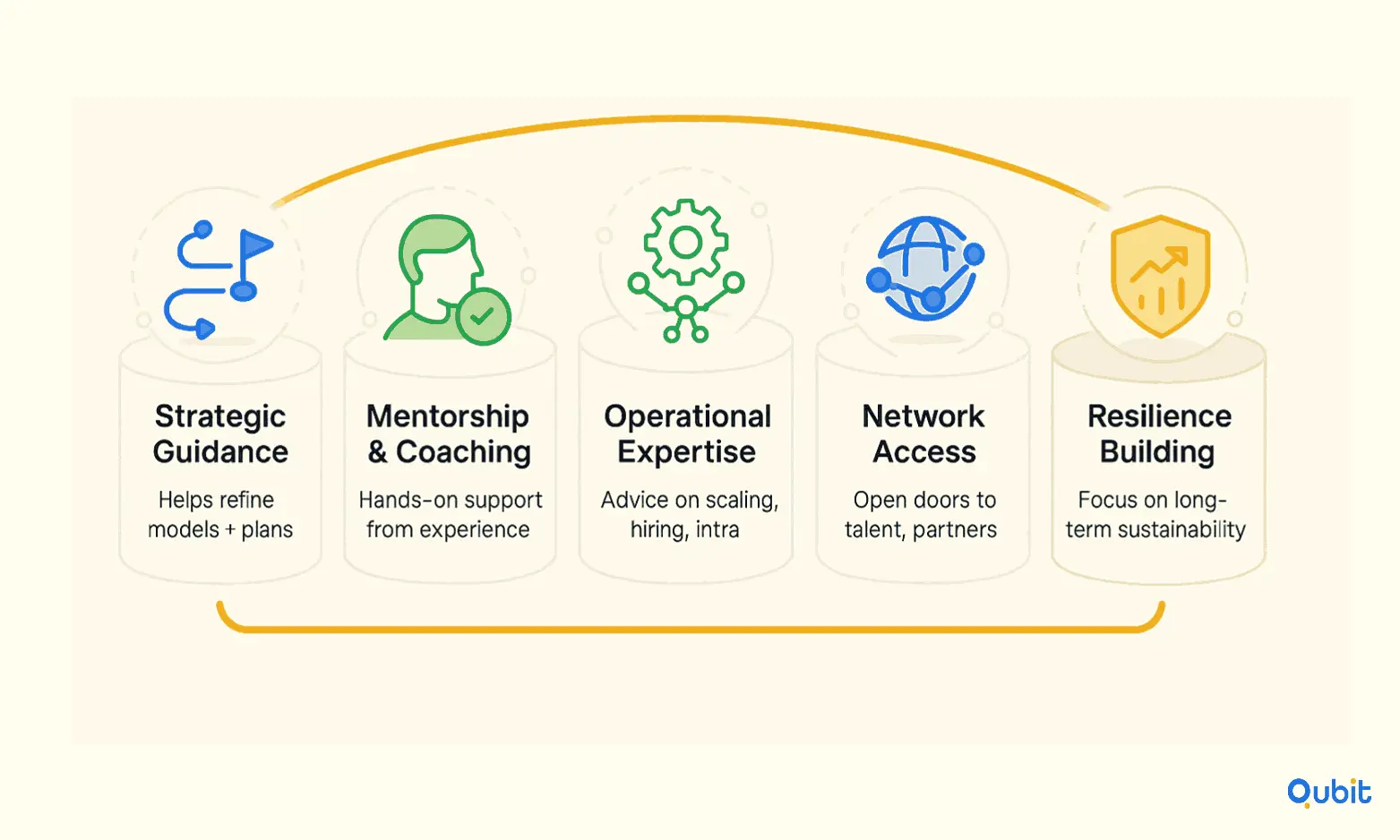When evaluating startups, investors often face a critical question: what truly drives success, product, vision, or execution? Each of these elements plays a vital role in shaping a company’s trajectory, yet their importance can vary depending on the stage of the business and the market it operates in. For early-stage startups, the balance between these factors can be particularly nuanced, requiring a keen eye to identify potential.
Your discussion connects naturally to the article on startup scouting strategies by providing foundational context that broadens your understanding of early-stage evaluations.
This article will explore how investors weigh these three pillars, product, vision, and execution, when making decisions. Let’s jump right in.
Investor Evaluation Overview: A Comprehensive Framework
Evaluating investors requires a multidimensional approach that balances vision, execution, and adaptability. This section introduces a framework that integrates startup vision, product roadmap alignment, and detailed evaluation criteria to guide founders through the investor selection process.
Qualitative metrics, such as team dynamics and market fit, play a pivotal role in assessing compatibility. Equally important are quantitative measures, including financial projections and substitute evaluations, which provide a data-driven perspective. Together, these metrics create a holistic view of an investor's potential to contribute to a startup's growth.
The framework also considers evolving market trends. As investors increasingly prioritize demonstrated execution over speculative growth, founders must adapt their pitch strategies to highlight proven milestones and scalability. This shift underscores the importance of aligning with investors who value sustainable progress over short-term gains.
By combining these elements, startups can identify investors who not only share their vision but also bring the expertise and resources needed to navigate market corrections and seize emerging opportunities. This comprehensive approach sets the stage for deeper discussions in the subsequent sections, ensuring founders are equipped to make informed decisions.
Due Diligence and Risk Assessment: Uncovering Hidden Risks
Thorough due diligence is the cornerstone of successful angel investing. While the potential for outsized returns is enticing, the inherent risks demand a meticulous evaluation process to uncover hidden vulnerabilities and validate a startup’s assumptions.
A robust risk assessment blends qualitative insights with quantitative benchmarks to provide a comprehensive picture. For instance, qualitative reviews often focus on the startup’s team dynamics, market fit, and scalability potential. These elements are critical for identifying whether the business idea is grounded in real-world feasibility.
On the quantitative side, metrics like average return windows and investment check sizes offer valuable benchmarks. Angel investors typically see returns materialize over 6-10 years, emphasizing the long-term nature of these investments. Similarly, even modest investments, such as an example check size of $25k, can yield significant returns if the startup executes effectively.
Combining these qualitative and quantitative tools ensures a systematic approach to risk assessment. This process not only highlights potential pitfalls but also strengthens confidence in the startup’s ability to deliver on its promises. For investors, adopting a structured pre-pitch evaluation process, such as the one outlined in the startup investor evaluation checklist, can further enhance decision-making.
Financial and Market Evaluation: Analyzing Growth and Viability
Understanding the financial and market dynamics of a startup is essential for assessing its potential for long-term success. Evaluating market size, growth potential, and financial health provides a comprehensive view of its investment appeal. For instance, early user engagement metrics, such as a "high download count" of 10,000 downloads, can initially seem promising. However, as recent analyses highlight, a shift from download-centric metrics to engagement-based metrics underscores the importance of user retention and activity over sheer numbers.
Market dynamics and competitive analysis also play a pivotal role in shaping investment decisions. Platforms like App Annie offer valuable insights into competitor performance and market trends, enabling investors to gauge a startup's traction within its industry. Similarly, tools like Product Hunt can help assess brand presence and compare products in the same category, providing critical context for competitive positioning.
Financial ratios, such as profitability and liquidity, remain indispensable in evaluating a startup's financial health. Yet, these traditional metrics are increasingly complemented by qualitative factors like user engagement and market adaptability.
Management and Team Evaluation: Assessing Leadership & Execution
A startup’s success often hinges on the strength of its management team. The ability to execute a vision effectively is a critical factor that investors evaluate when assessing a company’s potential. Leadership traits such as strategic foresight, adaptability, and operational efficiency play a pivotal role in ensuring that a startup can overcome challenges and capitalize on opportunities.
Investors are particularly drawn to founders and teams who demonstrate resilience under pressure. This quality not only reflects their ability to handle setbacks but also their commitment to driving the business forward despite uncertainties. Visionary leaders who can articulate a clear roadmap while adapting to market dynamics inspire confidence and attract the resources needed for growth.
A strong management team also provides a competitive advantage. Their collective expertise and decision-making capabilities reduce the likelihood of missteps, thereby mitigating risks for stakeholders.
When assessing leadership dynamics, it’s essential to consider both individual and team-level effectiveness. This broader evaluation framework is enhanced by an exploration of startup success signals, which adds context to how founder impact and operational metrics play a role.
Product and Service Validation: Confirming Market Relevance
Understanding whether a startup’s product or service addresses a critical market need is a decisive factor for investors. A solution that resolves a significant, painful problem not only attracts attention but also lays the groundwork for long-term success.
The first step in this process involves evaluating the product’s uniqueness. Does it stand apart from competitors in a way that resonates with the target audience? This differentiation is crucial for capturing market share and sustaining growth. Equally important is assessing market fit—how well the product aligns with the needs and expectations of its intended users. A strong market fit often signals that the startup has done its homework in understanding its audience.
Scalability is another essential consideration. Investors look for solutions that can grow without significant barriers, ensuring that the business can expand efficiently as demand increases. Early customer feedback plays a pivotal role in this validation process. Positive responses, especially when accompanied by a willingness to pay, serve as strong indicators of a product’s viability.
By focusing on these factors, investors can make informed decisions, ensuring their support goes to startups with the potential to thrive.
Negotiation and Investment Decision: Aligning Interests
Securing an investment deal is as much about strategy as it is about understanding the finer details. Negotiating terms requires a deep comprehension of deal structures, valuation implications, and the trade-offs that ensure both parties—investors and startups, achieve their objectives.
A successful negotiation begins with clarity on the startup’s potential and risk profile. Investors often evaluate not just the current performance but also the scalability and long-term viability of the business. Startups, on the other hand, must assess how the proposed terms align with their growth goals. For instance, valuation directly impacts equity distribution, which can influence control and decision-making power. Striking the right balance here is critical to fostering a partnership that benefits both sides.
Trade-offs are inevitable during this process. Startups may need to prioritize certain terms, such as securing operational autonomy, while compromising on others, like valuation. Similarly, investors might seek protective provisions to safeguard their capital while remaining flexible on timelines for returns. The ultimate goal is to align interests in a way that builds trust and ensures mutual success.
Value Beyond Funds: Strategic Support for Long-Term Success
Investors are increasingly redefining their role in the startup ecosystem, focusing on contributions that extend far beyond financial backing. While capital remains essential, the true value of an investment often lies in the strategic guidance, mentorship, and access to networks that investors provide. These elements can be pivotal in helping startups achieve product-market fit and sustainable growth.

Active involvement from investors can transform a startup’s trajectory. By offering operational expertise and industry insights, investors enable founders to make informed decisions, refine their business models, and overcome challenges. Programs that emphasize value-added support, such as mentorship and strategic planning, are becoming highly sought after. For example, an Invitation to apply to a value-add program providing strategic guidance highlights how specialized initiatives can deliver more than funding, offering mentorship and operational support to enhance long-term success.
This shift toward value-added investment strategies reflects a growing recognition that startups thrive when they receive holistic support. Investors who actively engage in their portfolio companies’ development not only increase the likelihood of financial returns but also contribute to building resilient businesses. By prioritizing strategic collaboration, investors position themselves as true partners in success, fostering innovation and sustainable growth in the startup ecosystem.
Conclusion
A successful investment journey requires a structured approach that combines thorough evaluation, strategic due diligence, and a clear narrative framework. From assessing investor alignment and conducting market analysis to evaluating team dynamics, validating product-market fit, and negotiating effectively, each step plays a critical role in identifying high-potential opportunities. These strategies not only minimize risks but also maximize the potential for long-term returns.
At Qubit Capital, we understand the importance of connecting investors with startups that align with their goals and values. If you're looking to connect with high-potential startups, we can help through our Startup Matchmaking service. Let us guide you toward opportunities that resonate with your vision.
Key Takeaways
- A robust investor evaluation framework integrates product, vision, and execution metrics.
- Due diligence and risk assessment are vital for uncovering hidden challenges and validating potential returns.
- Market and financial evaluations highlight the importance of user engagement and competitive positioning.
- Strong management and team execution reduce risk and enhance investment outcomes.
- Value beyond funds, including strategic mentorship and network access, drives long-term success.
Frequently asked Questions
What factors do investors look for in a startup?
Investors typically prioritize product uniqueness, market size, team capability, and a proven track record of execution when evaluating startups.






